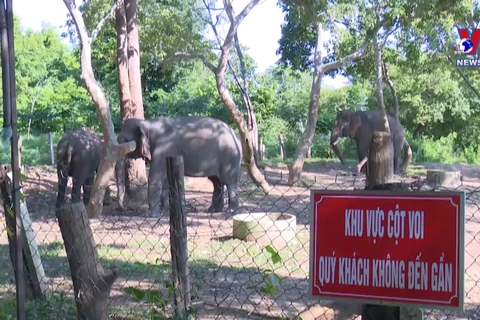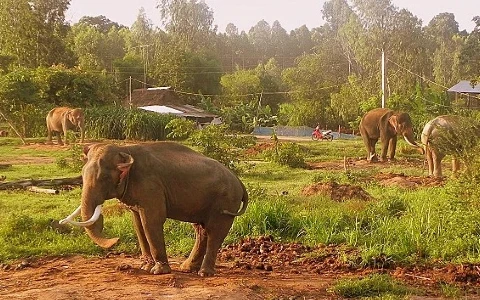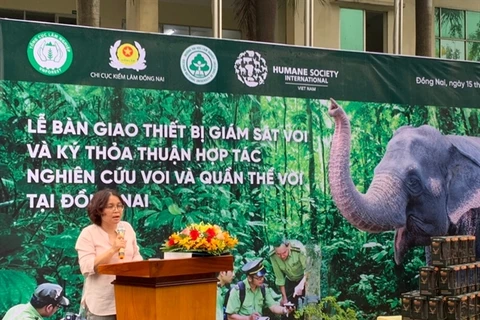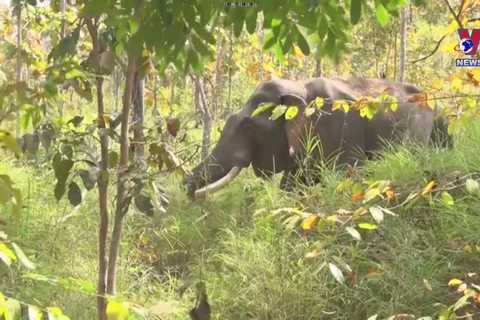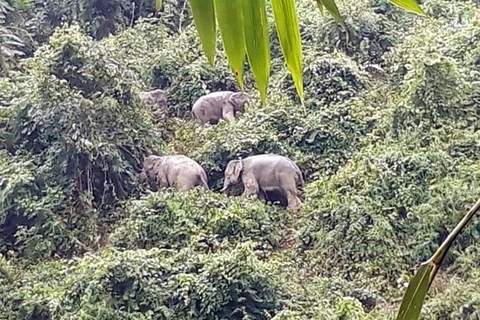 Elephant ivory products are displayed at a shop in the Central Highlands province of Gia Lai. (Photo: VietnamPlus)
Elephant ivory products are displayed at a shop in the Central Highlands province of Gia Lai. (Photo: VietnamPlus) Hanoi (VNA) – Vietnam is home to several wild elephant populations, as well as the long-standing practice of elephant taming in the Central Highlands, but it is also a point of transit and a destination for the ivory trade from Africa. Given this, it is critically important to take action to conserve the animal in Vietnam and contribute to common efforts to protect African elephants from poaching.
On May 21, 2013, the Prime Minister approved a project on elephant conservation in Vietnam for the 2013 - 2020 period to conserve and sustainably develop wild and domesticated elephants in the country and enhance law enforcement cooperation to curb the trafficking of ivory and elephant-related products.
On March 31 this year, the Government leader decided to extend the project to 2025 and add some more localities to this project, which once again affirmed the urgency of elephant conservation.
However, despite conservation efforts, elephant ivory, hair, and bone have still been exploited in different forms.
In 2021, Education for Nature Vietnam (ENV) recorded 575 violations related to elephant ivory which has not only affected conservation endeavours but also eroded Vietnam’s image in the international community’s eyes.
Trinh Le Nguyen, Director of the People and Nature Reconciliation (PanNature) centre, told VietnamPlus that under the impacts of socio-economic development and ecosystem degradation, many elephants and other big animals like rhinos and tigers have gradually disappeared.
Statistics show that the elephant population in Vietnam has fallen sharply to just over 100 at present, from about 1,500-2,000 in the 1990s.
Nguyen said a challenge to conservation efforts is trading products made from elephant ivory, bone, and hair, though the country has imposed a ban on this practice.
He blamed this partly on some people’s groundless trust in the so-called “good luck” brought about by elephant ivory and hair and their lack of knowledge that their consumption may lend a hand to elephant poaching, exploitation, and related product trading.
Furthermore, he noted that law enforcement and penalty impositions have not been stringent enough, enabling the trading of elephant-related products.
 Elephants being used in tourism in Lak district of the Central Highlands province of Dak Lak. (Photo: VNA)
Elephants being used in tourism in Lak district of the Central Highlands province of Dak Lak. (Photo: VNA) ENV Deputy Director Bui Thi Ha said local authorities hold certain responsibility for the lingering trade of those products, pointing out that since trading ivory and wildlife products generate huge profit, many people have disregarded legal regulations to commit wrongdoings.
She said that the practice could be eradicated only when local authorities pay due attention and take strong actions to deal with the issue strictly.
Nguyen held that raising public awareness of regulations and the necessity to stop using elephant-related items to conserve the mammal is also important.
The PanNature director recommended State agencies ramp up law enforcement, boost the examination and settlement of product transportation and trading activities, and review the elephant situation in Vietnam and existing conservation programmes to learn lessons and enhance conservation efforts.
Meanwhile, Ha suggested local authorities increase inspecting jewellery and souvenir shops to prevent illegal advertising and trading of ivory and elephant-related products.
In-depth investigations are needed to uncover and handle ivory and wildlife trafficking rings. Ha added that most of the ivory products sold in Vietnam have material hailing from Africa. Trading those items has not only put pressure on local conservation efforts but also contributed to a decline in the elephant population in other countries, especially in Africa.
She voiced her concern that without timely actions, elephants, bears, and many other endangered animals will become extinct shortly, like what happened to the Javan rhino, which was declared extinct in Vietnam in 2010 due to poaching for horns./.
